TODAY’S READING IN THE OLD TESTAMENT – Genesis 3:1-4:26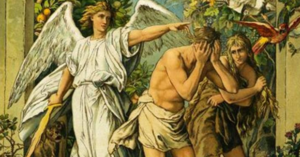
In Genesis 3 we have the account of the fall of humanity. But we also have a prophetic picture of the gospel- the foreshadowing of God’s promised provision of the Virgin-born Messiah-the seed of the woman, who would defeat the devil, reverse the curse, and cloth our nakedness in His righteousness as the Lamb of God for sinners slain.
The first mention of the Coming Redeemer is found in Genesis 3:15. Theologians call this the “protoevangelium”, the first mention of the gospel.
Genesis 3:14-15 (NASB) 14 The LORD God said to the serpent, “Because you have done this, Cursed are you more than all cattle, and more than every beast of the field; on your belly you will go, and dust you will eat all the days of your life; 15 And I will put enmity between you and the woman, and between your seed and her seed; He shall bruise (crush-NIV ) you on the head, and you shall bruise him on the heel.”
The Promised Redeemer would be “the seed of a woman”. The expression, “to crush the head” is an oriental expression meaning to “depose the governmental ruler”. This is the prophetic picture of the Messiah who would not be the Son of Fallen Man, but the Son of God, born of a virgin. He would come to save us from our sins and destroy the works of the devil, deposing his rule.
In Genesis 3:21 we have a picture of the failure of human attempts to cover sin (Operation Fig Leaf!) in contrast to God’s provision, the sacrifice of an innocent animal on behalf of the guilty sinners, a prophetic picture of the sacrificial Lamb of God, Jesus Christ (John 1:29).
Genesis 3:21 21 The LORD God made garments of skin for Adam and his wife, and clothed them.
This is the gospel of God–the good news of the Son of God, the Messiah, and the provision of His perfect atoning sacrifice.
GENESIS 4
The gospel presented in Genesis 3:14-15 and 3:21 was to be passed on to Adam’s children.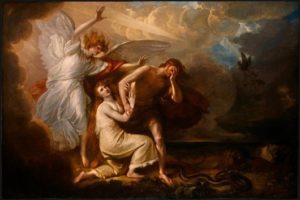
Prior to the fall, the man and the woman lived as a one flesh unit. They shared the same name. After the fall, with sin, came dissolution of oneness. The woman was named Eve. Whereas Adam was created in God’s image, Adam’s children were born in the image of fallen man (Genesis 5:3), the image of God being there as more of a shadow. Therefore, although Adam was the first man, his son, Cain, was not qualified to be called ‘the second man’. Cain was no longer, man, as God created man to be. Instead of being filled with the Holy Spirit, his nature was fallen, and he was spiritually subject to the dominion of the god of this age, Satan. Never in human history would there be another ‘man’ until the Messiah. He would qualify as the ‘second man’ because He was born, not of Adam’s seed. He would be, as Adam was originally, born without sin (1 Corinthians 15:47). His obedience would be tested. Where the first man Adam disobeyed and brought sin and death into the stream of humanity, Jesus would obey and bring righteousness that would be extended as a gift to believers, and a new stream of humanity that would be born of the Holy Spirit.
Abel, the second son of Adam, is a picture of one who is obedient to the gospel (Hebrews 11:4). Cain brought to God what he thought best. He is a picture of man living by human reason without revelation. His religion is one of self-redemption.
Abel trusted God’s Word and brought what God required- an innocent animal substitute, a type of Christ. This sacrificial system was instituted as a means of communicating the gospel. Abel received the witness from the Holy Spirit that He was accepted by God on the basis of the sacrifice of another made on his behalf, Jesus Christ, the Lamb of God who takes away the sin of the world.
Cain rejected the gospel. Although God appealed to him that both a sin offering and the rule of sin were at his doorstep, Cain rejected the sin offering and submitted to the rule of sin.
“By faith Abel offered God a better sacrifice than Cain did. By faith he was commended as a righteous man, when God spoke well of his offerings.” (Heb 11:4)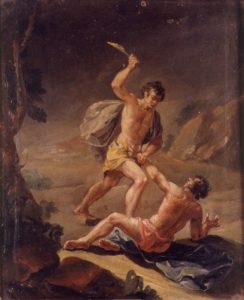
We see the first case of depression in Cain (Genesis 4:6). Failing to believe the gospel, he does not have the witness of God’s acceptance. He is still in his sins and under God’s wrath. He is angry that he is not accepted by God by living on his own terms. He is jealous of his brother Abel’s peace and joy. The spirit of antichrist takes over and we have the first religious war. Cain rises up to persecute and kill Abel.
“This is the message you heard from the beginning: We should love one another. 12 Do not be like Cain, who belonged to the evil one and murdered his brother. And why did he murder him? Because his own actions were evil and his brother’s were righteous.” (1 John 3:11-12)
Abel is a foreshadowing type of Christ who was despised, rejected, and slain by His brothers. Abel was the first shepherd and Jesus is the Great Shepherd (John 10:11). Abel died a violent death and his blood called for judgment. Jesus died a violent death but His blood cries out for mercy. (Hebrews 12:24)
The rest of Genesis 4 is a powerful study on human sociology. The Fall affects everything. Death came into the world. Creation, now under the curse, became subject to futility. Yet, as Hans Rookmaaker points out in his book, “The Creative Gift”, “despite all the frustration, futility and suffering, our daily life still has meaning and is waiting to be set free from the bondage of decay (Romans 8:21)”.
God made it clear that the ‘seed of the woman’ could crush the serpent’s head (depose the rule of the usurper) and be victorious over sin and death. When their first child was born, Adam and Eve named him ‘Cain’ meaning ‘acquired of the Lord’. Perhaps they named him in hope that he was the promised Messiah. It was not long before they realized Cain was not the deliverer. They named their second child ‘Abel’ meaning vanity. They knew that their deliverance would not be through Adam’s seed.
After Abel is killed, the blood of Abel cries out for vengeance, yet God promises to be Cain’s protector, putting a mark on his forehead.
The cultural mandate that mankind was to develop and utilize this world remained in force. Cain and his descendants represent ‘the self-sufficient man’ who does things his own way without reference to God.
Seth (whose name means ‘appointed one’ or ‘substitute’) and his descendants seek to develop and cultivate the created world, but in God’s way and in God’s time. They foreshadow those called to be ‘salting salt’, salt that has not lost its savor and potency, redemptively preventing the spread of corruption, and flavoring the world.
In the remainder of the chapter, we have the development of the arts and sciences along these two lines. Both lines are operating within the same framework of God’s creation. Both lines have the same goal of realizing this world’s possibilities and making it a good home for mankind. They share this common calling, yet, as foreshadowed by the name ‘Seth’, the line of Seth seems to recognize that complete redemption from the curse will not come from man’s independent efforts, but through the Messianic promise, the seed of the woman, who will judge evil and reverse the curse.
Although it may seem that the line of Cain and Lamech is more active in cultural work, it is the redemptive work of “the Substitute’ that will last and bring about the renewed earth.
TODAY’S READING FROM THE NEW TESTAMENT: MATTHEW 2:13- 3:6
Jesus is the promised seed of the woman, come to reverse the curse. The seed of the serpent, the corrupt world system, the offspring of the devil, express hostility towards Jesus as soon as he is born (Matthew 2:1-16). In his attempt to destroy the Messiah, Herod gave orders to kill every male child in Bethlehem, two years old and under (2:16).
Matthew gives us insight into God’s sovereign protection in delivering Jesus from His would-be killers. In doing so, Messianic prophecies were being fulfilled (Hosea 11:1; Numbers 24:8; Exodus 4:22).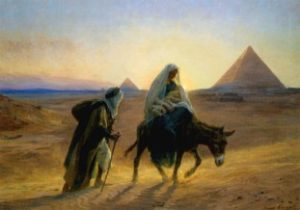
God graciously spoke to Joseph several times in his dreams (Matthew 1:20, 2:13, 19, 22). God speaks to us primarily through His written Word, but we should be open to Him speaking to us subjectively in ways the prophets foretold (Acts 2:17, Joel 2:28) while being careful that all impressions are consistent with, and subservient to, the whole counsel of God in Scripture.
Matthew also carefully points out that John the Baptist fulfills the prophecies regarding the one who would call Israel to repentance and prepare the way for the Messiah (Matt. 3:3; Isaiah 40).
Give thanks to God for the gift of His Son. Worship the One who was born King and came to save us from our sins (Matt 2:1; 1:21). Jesus went right to the root of our problem. John the Baptist says it well: “ The ax is already at the root of the trees, and every tree that does not produce good fruit will be cut down and thrown into the fire.”. Jesus did not come to prune our sinful nature. He came to deal with its root. He goes right back to the beginning of the problem- Adam. Where Adam fell into disobedience, Jesus would bring judgment on Adam and his progeny, as “the last Adam”, by identifying Himself with his sin on the cross (1 Corinthians 15:45). Sin would be cut down and thrown into the fire. As “the second man”, the federal head of a new humanity, he would rewrite our history as one of perfect obedience (1 Corinthians 15:47; 2 Corinthians 5:17).
Jesus, though sinless, identified with the natural man in baptism. Notice the commendation by the attending persons of the Trinity. This is my beloved Son in whom I am well pleased! (Notice also that the dove who is not seen in the Bible after being sent out by Noah after the old creation is judged (Gen. 8:12), is finally seen in Matthew 3:16 resting on the head of Jesus Christ, the second man, the head of THE NEW CREATION!)
Where the first man was tested and failed, this man. Jesus would succeed. The woman (whose name at the time was also Adam) was tempted in the garden to live autonomously and to break fellowship with God through disobedience at the tree of the knowledge of good and evil through the lust of the flesh (she saw that the fruit was good for food) the lust of the eyes (a delight to the eyes) and the pride of life (desirable to make her wise). (See 1 John 2:16). Jesus was tempted in the wilderness in the same areas: the lust of the flesh (to make stones bread, to break fellowship with the Father and to satisfy his hunger independently from the Father’s provision); the lust of the eyes (Luke has this as the second temptation, Matthew the third- to behold the glory of the kingdoms of this world) and the pride of life (prove who you are by casting yourself down from the pinnacle of the temple and commanding angels to save you).
As Jesus resisted the temptation to worldliness and sin by hiding the Word of God in His heart, let us do the same!
4 Jesus answered, “It is written: ‘Man does not live on bread alone, but on every word that comes from the mouth of God.'” (Matthew 4:4)
TODAY’S READING IN THE BOOK OF PSALMS- Psalm 2:1-12.
Psalm 2- Jesus is the Son of God
Yesterday in Psalm 1 we read about “The Blessed Man”, true to God’s Word. We learn that as we abide in Him, meditating in His Word day and night, we will bring forth the fruit of a Christ-like character in every season. What a great prospect for the new year!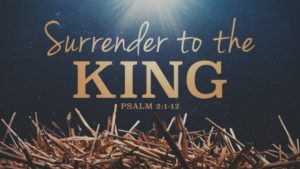
Today we read about the reign of the Son of God over the nations. In Psalm 1 we read of ‘delighting in the law of God’. In Psalm 2 we read of the leaders of this world who defy the law of God. Psalm 1 is never quoted in the New Testament, yet Psalm 2 is quoted at least 18 times! It is quoted more than any other Psalm. It is a royal psalm depicting of God’ anointed upon the throne and the nations who resist His rule.
It is by trusting the Son of God, joining ourselves to Him by faith, and trusting in His saving work on the cross, that we gain peace with God. His atoning sacrifice has made a way for God’s wrath to be turned away so that we might not perish (Psalm 2:12).
Whereas Psalm 1 began with a blessing, Psalm 2 ends with one:
Psalm 2:12 12 Kiss the Son, lest he be angry, and you perish in the way, for his wrath is quickly kindled. Blessed are all who take refuge in him.
TODAY’S READING IN THE BOOK OF PROVERBS- Proverbs 1:7-9:
Proverbs 1- Jesus is our Wisdom from God (1 Cor 1:30; Prov 4). Christ makes known the Truth about God, for He is the Truth, and He is God, the second person of the Trinity.
What a person thinks about God is the most important thing. The beginning of Wisdom is to reverence the Truth about God made known through Christ Jesus.
Proverbs 1:7-9 (NASB) 7 The fear of the LORD is the beginning of knowledge; Fools despise wisdom and instruction. 8 Hear, my son, your father’s instruction and do not forsake your mother’s teaching; 9 Indeed, they are a graceful wreath to your head and ornaments about your neck.
Notice the starting point for true knowledge- It is the revelation of God’s answer to the human dilemma- Christ- “in whom are hidden all the treasures of wisdom and knowledge” (Colossians 2:3).
Thank God for all those spiritual fathers and mothers who bring us the knowledge of the Truth.
PRAYER- Thank You LORD for your Wisdom, Your perfect solution, Your merciful Provision of a full salvation through Your Holy Son, Our Lord and Savior, Jesus Christ. Like Abel, we put our trust in Your Provision of a Sinless Substitute, our Lord Jesus, rather than our own works. We have no righteousness of our own to bring before you. Thank you for giving us Yourself to be our Righteousness (Jer 23:6; 33:16; 1 Cor. 1:30; 2 Cor 5:21) and winning the way back to paradise for repentant sinners to look to Jesus, the Lamb of God who takes away the sin of the world!
-Pastor David
